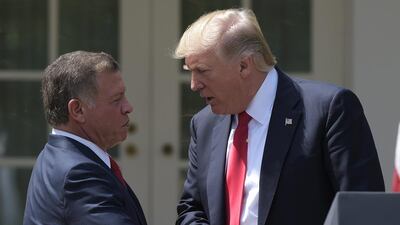NEW YORK // US president Donald Trump condemned this week’s chemical attack in Syria as an “affront to humanity” during a news conference on Wednesday with Jordan’s King Abdullah, as the two men agreed to redouble their joint efforts in fighting ISIL and seeking an Israeli-Palestinian peace agreement.
Mr Trump said the deaths of innocent men, women and children in the northern Syrian town of Khan Sheikhoun on Tuesday had “crossed many lines”, forcing him to rethink his stance on president Bashar Al Assad and his government.
“That attack on children yesterday had a big impact on me. Big impact,” said Mr Trump. “My attitude towards Syria and Assad has changed very much.”
“These heinous actions by the Assad regime cannot be tolerated.”
The president’s words suggested he was reconsidering comments made by his key diplomatic lieutenants in the past week that removing Mr Al Assad was no longer a priority for US foreign policy.
Mr Trump also said he had promised King Abdullah additional financial support to help cope with the flood of refugees from Syria.
For his part, King Abdullah thanked the US president for addressing Syria and the broader Middle East’s problems.
“Terrorism has no borders, no nationalities, no religion and therefore joint action with a holistic approach ... is crucial,” he said.
King Abdullah had arrived in Washington on Tuesday to seek US help for a fresh regional push for peace between Israel and Arab states. He carried a message of unity from other Arab leaders and a reminder that solving the Israel-Palestine conflict once and for all was the best way of ensuring solutions to other regional problems.
“The president’s early engagement in bringing the Palestinians and Israelis together has been a very encouraging sign for all of us,” he said in the April sunshine of the White House rose garden.
The leaders’ discussions were overshadowed by the latest news of atrocity in Syria, however.
“These thresholds of inhumanity and savagery that are being crossed everyday is something that I know the president will not allow to happen,” said King Abdullah.
This week brought busy diplomatic activity for Mr Trump as he turned his attention to the Middle East, first welcoming Egyptian president Abdel Fattah El Sisi to the White House on Monday before meeting King Abdullah on Wednesday.
Trump administration officials have made no secret of their plan for the region. They want to build tighter alliances with moderate Sunni Arab leaders as part of a composite strategy to both defeat ISIL and thwart Iran’s influence.
In practice that means lifting Obama-era human rights conditions on arms sales and aid, and increasing support for partners fighting in Yemen, Syria and Iraq.
Arab leaders have welcomed the shift despite Mr Trump’s attempts to ban visitors to the US from six mostly Muslim countries.
Bahrain’s foreign minister was the latest to praise the new attitude this week, saying Mr Trump understood the region and the threats posed by Iran better than his predecessor.
“We see ... a much clearer understanding from the White House of the threats we are facing here in the region and especially the ones that are coming from the Islamic Republic,” Sheikh Khaled bin Ahmed Al Khalifa said in an interview with Reuters on Tuesday.
“The last few years, there was a policy that we think it was better for them to correct, and we advised them it should be corrected.”
Bahrain, which is seen as a key American partner and hosts the US Navy’s Fifth Fleet, has frequently accused Iran of radicalising and arming domestic opponents.
Sheikh Khaled also said his country welcomed a decision by the White House to pursue a US$5 billion (Dh18.36bn) sale to Bahrain of 19 Lockheed Martin F-16 aircraft and related equipment that was held up last year by the Obama administration due to concerns about human rights.
foreign.desk@thenational.ae

